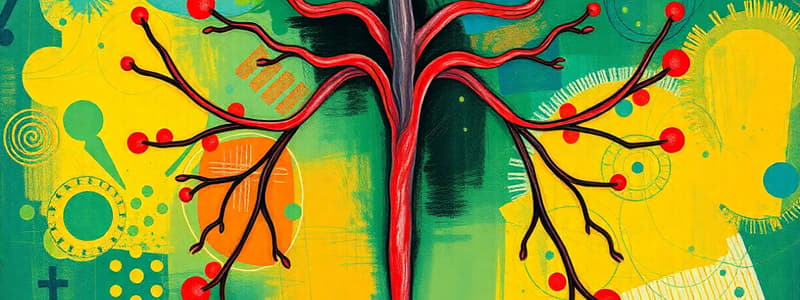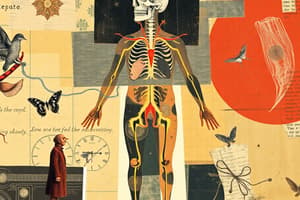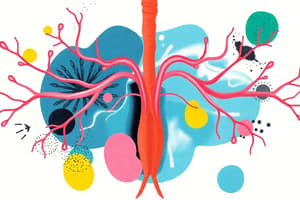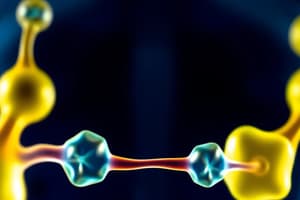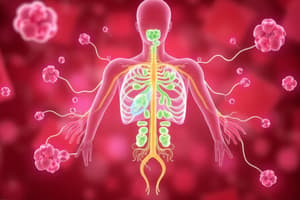Podcast
Questions and Answers
Which of the following is considered a primary endocrine organ?
Which of the following is considered a primary endocrine organ?
- Liver
- Kidney
- Heart
- Hypothalamus (correct)
What is one of the functions of hormones in the endocrine system?
What is one of the functions of hormones in the endocrine system?
- Respiration
- Metabolism (correct)
- Body temperature regulation
- Visual perception
Which hormone class is derived from cholesterol?
Which hormone class is derived from cholesterol?
- Eicosanoids
- Polypeptide hormones
- Amine hormones
- Steroid hormones (correct)
What structure is responsible for hormone receptor specificity?
What structure is responsible for hormone receptor specificity?
Which of the following hormones is classified as an amine hormone?
Which of the following hormones is classified as an amine hormone?
What is the role of cyclic AMP in hormone action?
What is the role of cyclic AMP in hormone action?
What type of modification can peptide hormones undergo after secretion?
What type of modification can peptide hormones undergo after secretion?
What is the function of eicosanoids in the body?
What is the function of eicosanoids in the body?
What is the role of negative feedback in hormone regulation?
What is the role of negative feedback in hormone regulation?
Which of the following best describes synergism in hormonal interaction?
Which of the following best describes synergism in hormonal interaction?
What is meant by up-regulation of receptors?
What is meant by up-regulation of receptors?
Which factor does NOT control hormone secretion?
Which factor does NOT control hormone secretion?
What is the effect of permissiveness in hormonal action?
What is the effect of permissiveness in hormonal action?
Which feedback mechanism increases hormone secretion?
Which feedback mechanism increases hormone secretion?
What is the primary function of the hypothalamic-pituitary-adrenal axis?
What is the primary function of the hypothalamic-pituitary-adrenal axis?
Which of the following best describes antagonism in hormonal interaction?
Which of the following best describes antagonism in hormonal interaction?
Flashcards are hidden until you start studying
Study Notes
Endocrine Organs
- Primary Endocrine Organs: Hypothalamus, Pituitary Gland, Thyroid Gland
- Secondary Endocrine Organs: Heart, Liver, Stomach, Kidney
General Functions of Hormones
- Metabolism: Regulation of metabolic processes
- Reproduction: Control of reproductive functions
- Development and Growth: Regulation of growth and development
- Adaptation: Adaptation to stress and environmental changes
- Gastrointestinal Function: Regulation of digestion and absorption
- Other Diverse Functions: Regulation of various bodily functions.
Chemical Classes of Hormones
- Polypeptide and Protein Hormones:
- Small peptide hormones: TRH (Thyrotropin-releasing hormone), Vasopressin
- Protein Hormones: Insulin, Growth Hormone
- Glycoprotein hormones: LH (Luteinizing hormone), FSH (Follicle-stimulating hormone), TSH (Thyroid-stimulating hormone)
- Steroid Hormones:
- Cholesterol-derived: Cortisol, Aldosterone, Sex Hormones (Estradiol, Testosterone)
- Amine Hormones:
- Amino Acid-derived: Epinephrine, Norepinephrine, Thyroxine
- Eicosanoids:
- Derived from Arachidonic acid: Prostaglandins, Thromboxanes, Leukotrienes
Peptide Hormones
- Many protein hormones undergo modifications during packaging and secretion:
- Pre-pro-insulin → Pro-insulin → Insulin
Mechanisms of Action of Hormones
- Hormone Receptors:
- Specificity: Receptors bind to specific types of chemical messengers
- Affinity: Receptors bind to messengers with varying strength
Receptor-Mediated Signaling
- Hormone Binding: Hormone binds to the receptor
- Transducer Activation: Activated receptor activates the transducer
- Second Messenger Generation: Transducer activates the second messenger generator (e.g. cyclic AMP, IP3)
- Effector System Activation: Activated second messenger triggers effector system activation
- Desensitization: Receptors desensitize or downregulate in response to prolonged exposure to hormones
Various Mechanisms of Hormone Action
- Cyclic AMP Mechanism: Hormones (ACTH, LH, FSH, TSH, ADH (V2R), HCG, MSH, CRH, b1 and b2 receptors, Calcitonin, PTH, Glucagon)
- IP3 Mechanism: Hormones (GnRH, TRH, Angiotensin II, ADH (V1R), Oxytocin)
- Steroid Hormone Mechanism: Hormones (Glucocorticoids, Estrogen, Testosterone, Progesterone, Aldosterone, Vitamin D)
- Other Mechanisms:
- Activation of Tyrosine Kinase: Insulin, IGF-1
- Cyclic GMP: ANP (Atrial natriuretic peptide), EDRF (Endothelium-derived relaxing factor)
- Thyroid Hormone: Activates specific nuclear receptors
Regulation of Hormone Action
- Regulation of Hormone Secretion:
- Control by Plasma Concentrations of Mineral Ions or Organic Nutrients: Plasma levels of minerals or nutrients affect hormone secretion.
- Control by Neurons: Hormones can be regulated by neuronal inputs.
- Control by Other Hormones (Tropic Hormones): Hormones can be regulated by other hormones.
- Feedback Control:
- Negative Feedback: Products of a pathway inhibit earlier steps.
- Positive Feedback: Product of a pathway stimulates its production.
- Circadian Regulation: Hormone secretion follows a daily cycle.
- Regulation of Receptors:
- Downregulation: Decrease in number of receptors in response to prolonged hormone exposure.
- Upregulation: Increase in number of receptors in response to reduced hormone exposure.
- Hormonal Interaction:
- Antagonism: Two hormones oppose each other's effects.
- Synergism: Combined effect of two hormones is greater than the sum of their individual effects.
- Permissiveness: One hormone requires the presence of another hormone to exert its full effect.
Studying That Suits You
Use AI to generate personalized quizzes and flashcards to suit your learning preferences.
